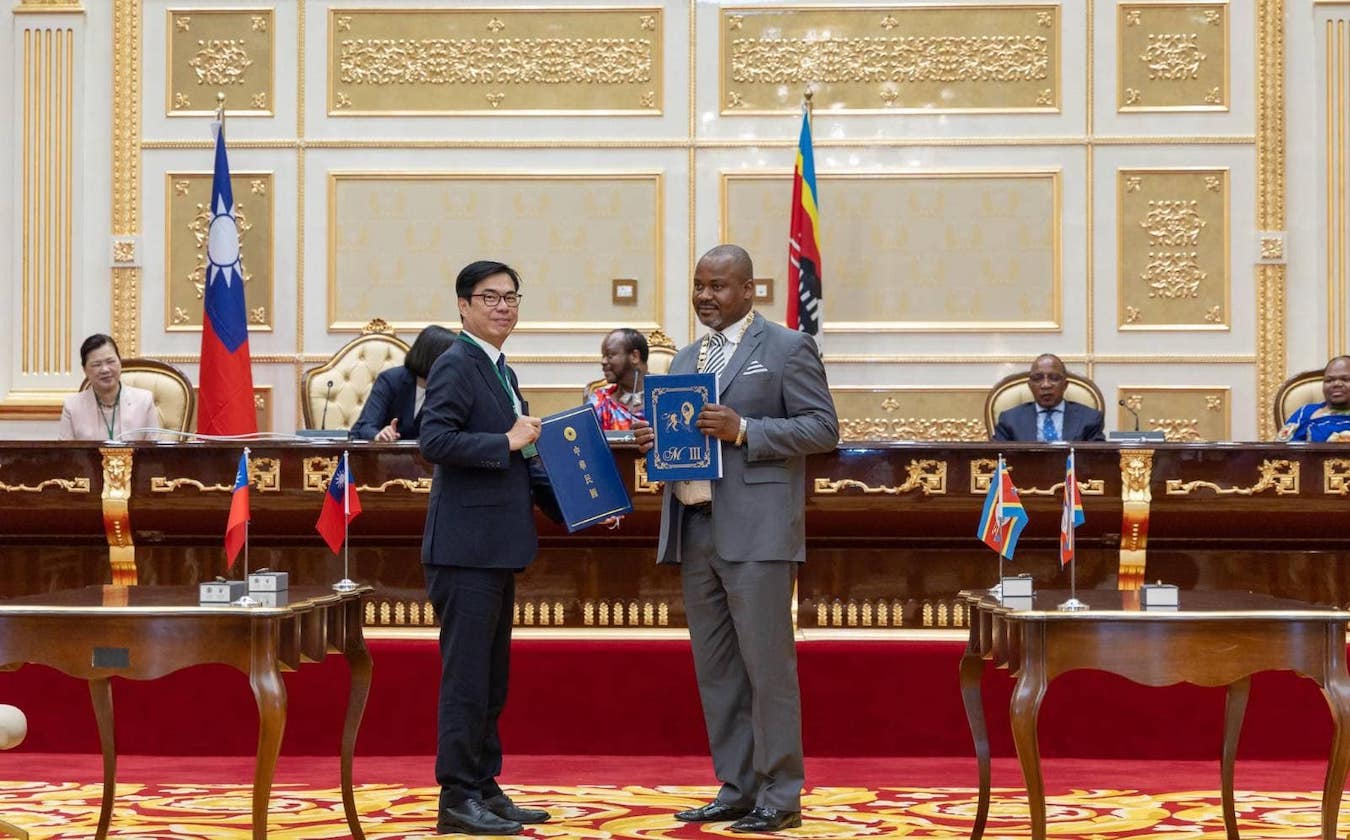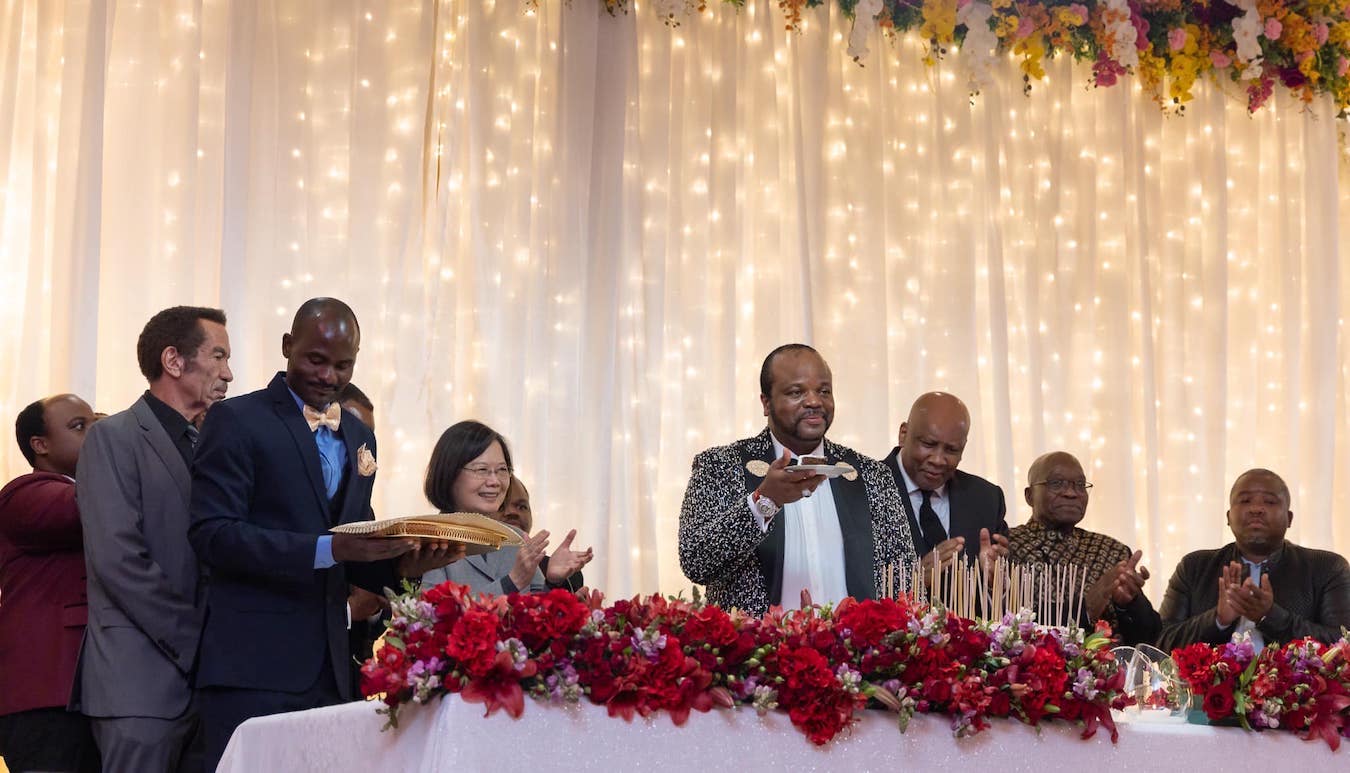by Brian Hioe
語言:
English
Photo Credit: Tsai Ing-wen/Facebook
A RECENT VISIT to Eswatini by Taiwanese president Tsai Ing-wen saw Tsai praise Eswatini for its support of Taiwan, while lauding the relationship between Taiwan and Eswatini as “the epitome of progress and development”. However, what Tsai did not mention in her comments was the fact that Eswatini’s government is an authoritarian one, as a country in which freedom of political association is forbidden and ruled over by one of the world’s last absolute monarchs.
Tsai’s visit to Eswatini lasted for four days. It is expected that this will be one of her last trips abroad during her administration, seeing as her second and final term is in its final stages, and elections will take place in January of next year. Tsai’s visit to Eswatini may have had next year’s elections in mind. Tsai was accompanied during this visit by Minister of Economic Affairs Wang Mei-hua, as well as Kaohsiung mayor Chen Chi-mai. Before the trip, 80 parliamentarians from 11 African countries issued a letter welcoming Tsai’s visit.
Namely, Tsai’s tenure has seen a decrease in Taiwan’s remaining diplomatic allies to thirteen from twenty-two when she began as president, due to Chinese diplomatic poaching. The most recent country to break ties with Taiwan was Honduras, which broke ties in March. The pan-Blue camp has sought to frame the loss of diplomatic allies under Tsai as due to diplomatic ineptness, as a result of which Tsai’s trip to Eswatini may have been to reassure, seeing as Eswatini is not likely to break ties with Taiwan anytime soon.
 Kaohsiung mayor Chen Chi-mai (left) and Mbabane mayor Vusi Tembe (right) signing a sister city agreement. Photo credit: Tsai Ing-wen/Facebook
Kaohsiung mayor Chen Chi-mai (left) and Mbabane mayor Vusi Tembe (right) signing a sister city agreement. Photo credit: Tsai Ing-wen/Facebook
Tsai touted aid from Taiwan to Eswatini in healthcare, women’s education, agriculture, and vocational training during her trip. According to Tsai, 5,000 women have been educated in business and financial management by Taiwan, while Tsai touted Taiwan’s efforts to help Eswatini in the fight against COVID-19. A sister city agreement was signed between Mbabane, Eswatini’s capital, and Kaohsiung during the trip, as presided over by Tsai and Eswatini’s King Mswati III. Likewise, Taiwan announced that it would be financing the construction of an oil tank with a capacity of 30 days, so as to reduce Eswatini’s dependency on South Africa for its oil supply, and financing loans for female entrepreneurs.
Otherwise, Tsai and Mswati III spoke of Taiwan and Eswatini’s long-standing friendship, inclusive of 55 years of diplomatic ties. The two touted that Taiwan and Eswatini should aim for one hundred years of friendship, while emphasizing that ties between the two are based on shared goodwill, rather than common interest.
Nevertheless, Tsai’s comments are darkly ironic. Just earlier this year, opposition politician Thulani Maseko was killed by unknown gunmen in a shooting widely suspected of being ordered by the monarchy. Maseko was a human rights lawyer and public intellectual. At the time, Mswati III stated, “People should not shed tears and complain about mercenaries killing them,” implying that he had ordered the killing.
The constitution was voided in 1973 and political parties were banned, as a result of which free and fair elections still do not take place in Eswatini today. Although Mswati agreed to constitutional changes in 2005, he retains his grip on power.
Pro-democracy protests rocked Eswatini in the summer of 2021, with the public calling for the right to vote. In the violence that followed, 28 were shot, with demonstrators alleging that at least twenty were killed. Tear gas was used by police against demonstrators and Internet services suspended, with a curfew declared in major urban centers in which buildings were burned during the turmoil, including Manzini and Mbabane, as well as the industrial center of Matsapha. The Eswatini government denied reports that Mswati III had fled the country during the demonstrations.
These demonstrations prove reminiscent of Taiwan’s past. Taiwan, too, was formerly an authoritarian state and it took decades of protest for Taiwan to have transitioned to its contemporary democracy. Nevertheless, after the demonstrations, Taiwan announced that it would be donating 637 million NT to the government for reconstruction–an act that makes it complicit in the government’s crackdown on the protests.
 Taiwanese president Tsai Ing-wen (left) and King Mswati III of Eswatini (right). Photo credit: Tsai Ing-wen/Facebook
Taiwanese president Tsai Ing-wen (left) and King Mswati III of Eswatini (right). Photo credit: Tsai Ing-wen/Facebook
Taiwan has long been accused of subsidizing infrastructure development projects or paying off politicians through slush funds in its diplomatic allies in return for recognition. This is so that such allies can continue to speak up for Taiwan in international bodies. Yet many of these countries have questionable human rights records.
At the same time, Taiwan is larger than all of its allies in terms of the size of its population and economy, and it could exert a powerful role in pushing the governments of these countries to change. Unfortunately, this usually does not occur, seeing as the loss of diplomatic allies is leveraged on for political attacks in Taiwan, and so the incumbent government is incentivized to maintain ties with regimes such as Mswati III’s in spite of the country’s poor record under his leadership. Indeed, life expectancy has halved in Eswatini since 2000.
One does not expect this to change anytime soon. For its part, Eswatini has stated that it does not expect friction with China over the visit, and Taiwan may be focused on maintaining relations with Eswatini seeing as it is Taiwan’s last remaining African ally–Taiwan may wish to avoid losing its foothold in Africa and this may, in fact, give Eswatini a special pride of place among its remaining diplomatic allies.

